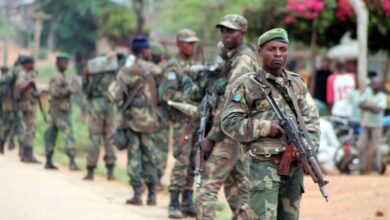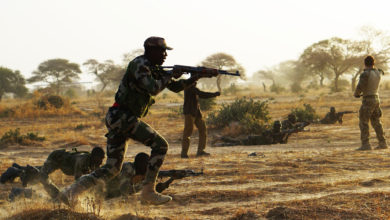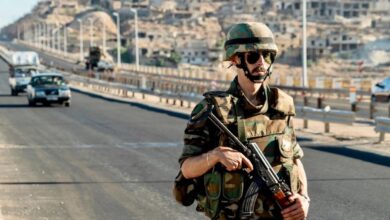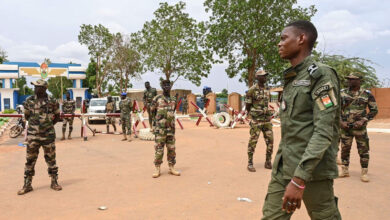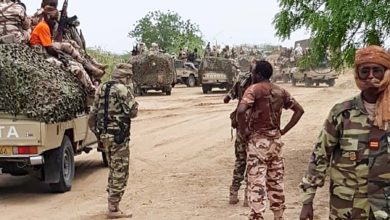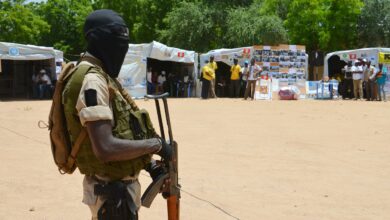A Nigerian Boko Haram commander was killed by his comrades over an alleged plan to surrender and hand over hundreds of hostages to the military, two sources told AFP on Sunday.
Ali Gaga was shot and killed on Thursday, September 27 by other commanders in Boko Haram’s Islamic State-affiliated faction of after they uncovered his plan to release 300 hostages in the Lake Chad region and hand them over to Nigerian troops before surrendering himself.
His death comes after the group’s de facto leader Mamman Nur was killed in August by radical lieutenants who accused him of betrayal and back-channel peace talks with authorities, sparking fears of a hardline takeover in Boko Haram.
“The new leadership of the faction got to know of his plans and executed him,” said one source about Gaga, speaking on condition of anonymity.
Gaga was forced to join what is now Islamic State West Africa Province in 2015 after the group seized his herd of cattle, the source said.
After joining the group he was trained in weapons handling and valued because of his mastery of the difficult terrain.
A source told The Nation that Gaga, a Fulani man from Taraba who became an ISWAP commander, “was not interested in holding captives for ransom like others,” and that he wanted to return to his family.
He was in touch with some mediators and had concluded arrangements to switch sides and “take along around 300 hostages with him when the group found out,” a second source told AFP. “Once they found out he was declared a traitor and killed.”
Hardline takeover in Islamic State West Africa Province
Boko Haram is divided into two factions that have competing goals and operational methods. One, led by Abubakar Shekau, is notorious for suicide bombings and indiscriminate killings of civilians. The other, known as Islamic State West Africa Province and led by Abu Mus’ab Al-Barnawi, largely focuses on attacking military and government targets.
ISWAP is dominant around the shores of Lake Chad, while the Shekau-led faction is concentrated in rural areas of Borno state.
More radical elements are said to have recently taken over the ISWAP leadership, prompting fears of an upsurge in violence against the local population. ISWAP has previously vowed to hit only military and government “hard” targets.
Barnawi, the son of Boko Haram’s founder Mohammed Yusuf, is widely seen as just a figurehead, with Mamman Nur directing day-to-day operations, but hardliners reportedly killed Nur on August 21 because of his more moderate approach.
The Nigerian military has in recent weeks intensified aerial bombings in the Lake Chad region where ISWAP is based, military sources told AFP.
Last week a high profile ISWAP commander called Abu-Nura was killed in one of the strikes on SabonTumbu village, the second source said.
Abu-Nura was in charge of Jibillaram-Dabar Masara axis in the Lake Chad region, the source said.
According to the source, a new commander in the name of Abu-Imrana has been appointed as a replacement.
Meanwhile, across the border, Chadian troops on Saturday killed 17 Boko Haram militants in a counter-offensive after six people, including two soldiers, were killed overnight on Friday in attacks near Lake Chad.
Chad, Cameroon and Niger have all joined the military effort by Nigeria to fight Boko Haram. Chad has seen a recent increase in attacks by the group.
The insurgency and military operations around Lake Chad have displaced 2.4 million people and about 11 million people in Chad, Niger, Nigeria and Cameroon rely on humanitarian assistance to survive, a group of NGOs said in August.
Boko Haram has lately intensified its armed campaign, launching a number of major assaults on military bases in Nigeria’s remote northeast region, although military commanders have strongly denied reports of heavy troop casualties.
The recent surge undermines repeated claims by the military that the insurgent group has been defeated, and Nigeria’s President Muhammadu Buhari’s insistence that Boko Haram are a spent force as he gears up for elections next year.
The jihadist insurgency is in its ninth year and has left more than 27,000 people dead and displaced 2.6 million, Although Boko Haram no longer controls the swathes of territory in northeast Nigeria it did at its 2014 height, its militants still pose a threat to the region.
With reporting from AFP


